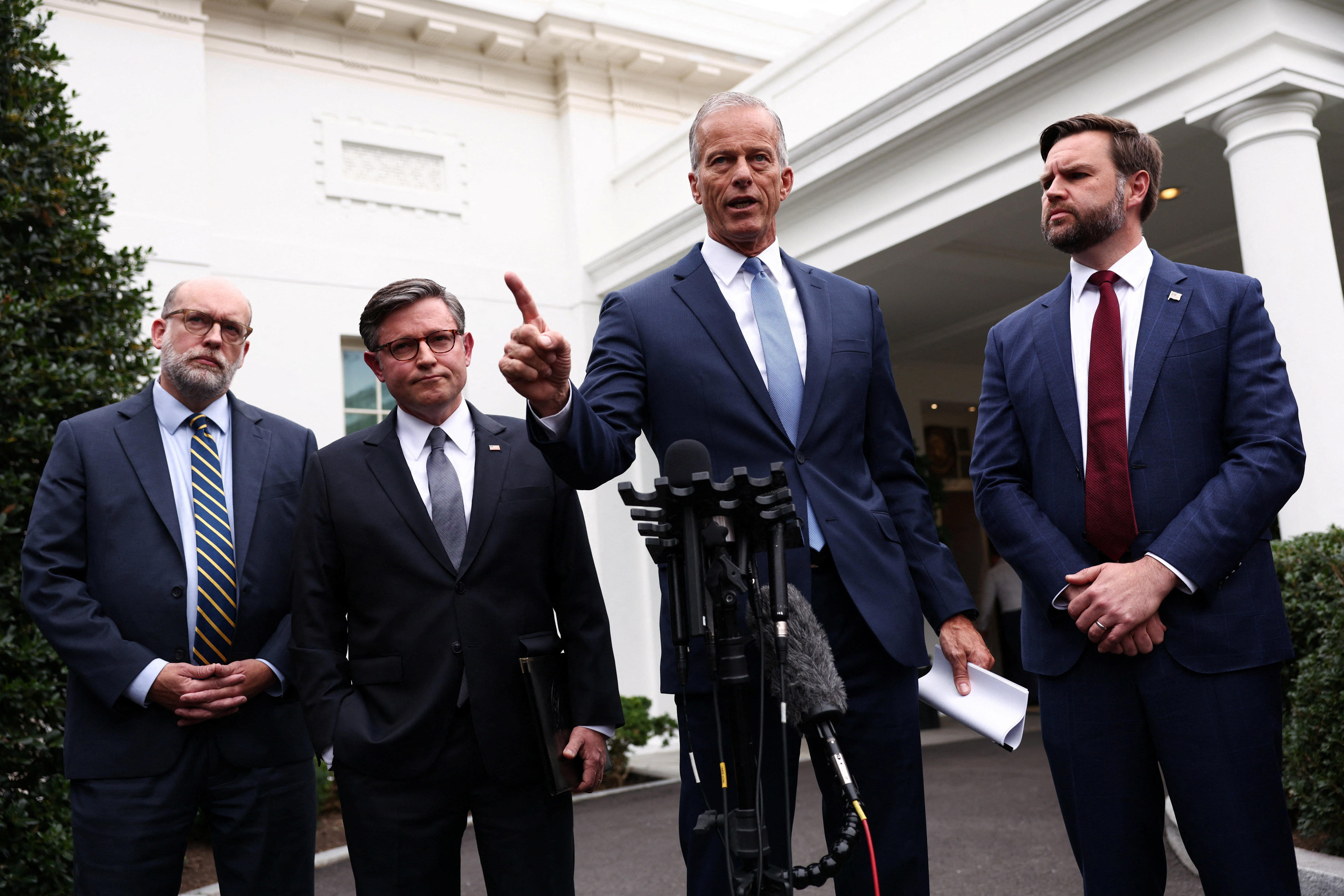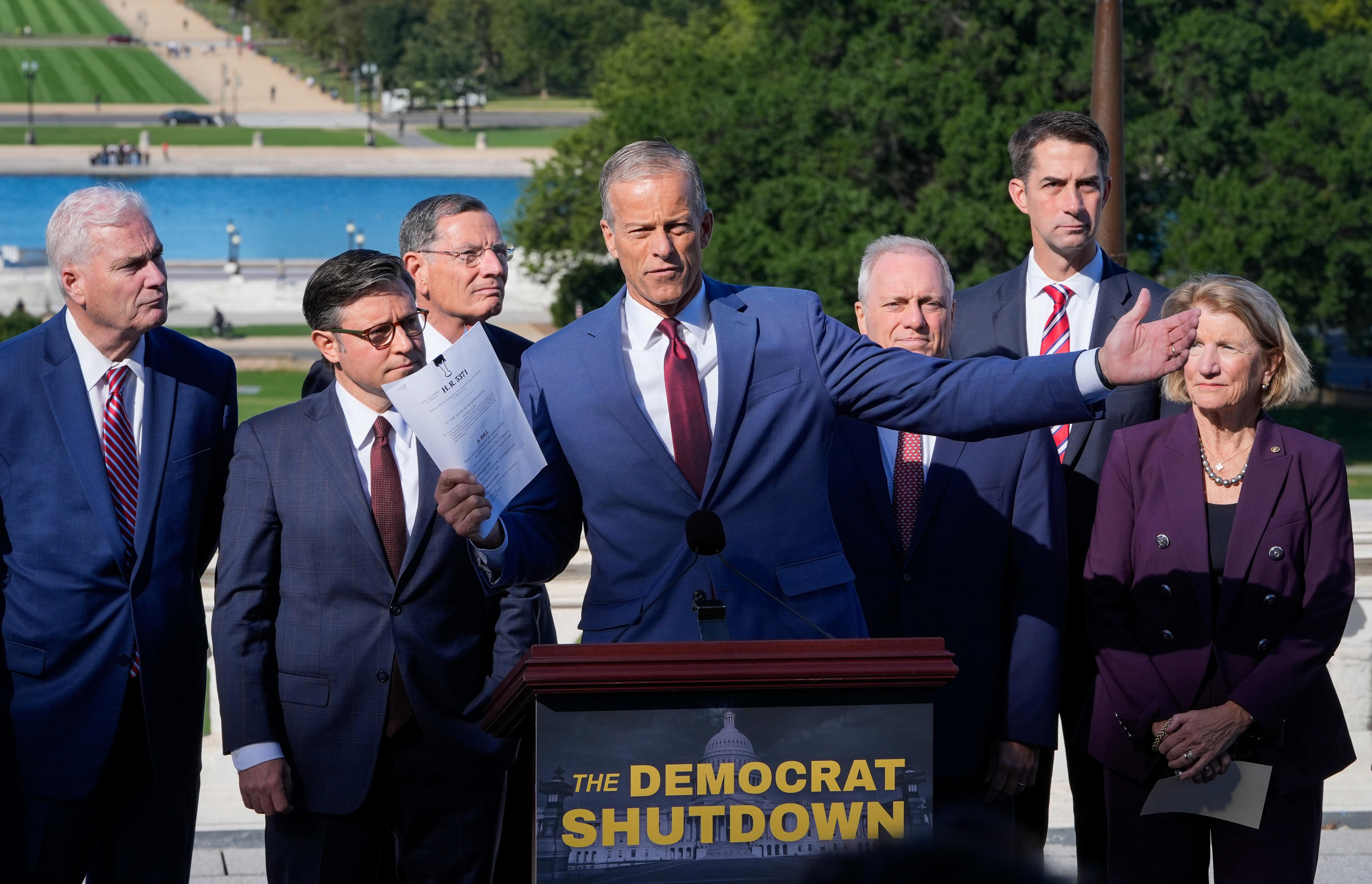Government Shutdown Update: Military Pay and Federal Layoffs Explained
Political Stalemate Continues as Government Shutdown Enters Third Week
As the government shutdown enters its third week, both top Republicans and Democrats remain entrenched in their positions, with each party blaming the other for the ongoing crisis. Americans are increasingly worried about the impact on federal jobs, military pay, and essential services.
Democrats continue to push for healthcare concessions before agreeing to reopen the government. House Minority Leader Hakeem Jeffries criticized Republicans during an appearance on "Fox News Sunday," stating that they view healthcare as an "extraneous issue." He emphasized that people should be able to afford medical care for themselves and their families.
House Speaker Mike Johnson responded by accusing Democrats of repeatedly voting to shut down the government. He stated, "It's real pain for real people, and they seem not to care."
Meanwhile, President Donald Trump has begun firing federal workers, though he has vowed to continue paying military members. At least 4,000 civil-service workers received layoff notices on October 10, a departure from past shutdowns where furloughs were more common. The administration warned that more layoffs are expected.
Civil servants received reduced paychecks on October 10, and military members are set to miss their first paycheck on October 15 unless Trump intervenes.
Impact on National Institutions and Events
The Smithsonian Institution’s 21 museums, along with the National Zoo, closed on Sunday due to the shutdown. These institutions are among the most popular in the country, drawing millions of visitors annually. The closure has also led to the offline status of several animal cams, including those featuring pandas, lions, elephants, and naked mole-rats.
Smithsonian officials confirmed that all animals at the National Zoo and its Conservation Biology Institute in Virginia will still receive food and care, but they have not planned to update social media beyond changes in operating status.
The Marine Corps Marathon, one of the most popular races in the country, is expected to proceed on October 26 despite concerns about the shutdown affecting the route. Organizers have stated that planning and preparations are continuing as scheduled, while closely monitoring the situation.
Other local races, such as the Army Ten-Miler, have seen some changes, including adjustments to the event expo. Meanwhile, two other DC races, the 2025 National Capital 20 Miler and Janet Braunstein 5 Miler, were canceled on October 3 due to the shutdown.
Social Security, Medicare, and Medicaid During a Shutdown
The Social Security Administration will continue issuing retirement and disability benefits, although it plans to furlough 12% of its staff and pause marketing campaigns. Payments under Medicare and Medicaid will also continue.
Presidential and congressional salaries remain unaffected by the shutdown. The president’s $400,000 annual salary is protected by the U.S. Constitution, and lawmakers will also continue receiving paychecks. However, some lawmakers, including Sen. Andy Kim (D-NJ), Rep. Josh Gottheimer (D-NJ), and Rep. Kat Cammack (R-FL), have pledged not to take compensation during the shutdown.
Effects on Education and Federal Workers
The Department of Education experienced significant layoffs on October 11, cutting roughly a fifth of its workforce. While public school teachers largely continue to receive pay through local and state funding, some federal employees, such as those working on military bases, may go unpaid during the shutdown.
Additionally, the shutdown has halted a long-standing federal funding program that supports schools with limited local tax revenue, affecting military bases and tribal lands.
Food Aid Programs Continue Despite Funding Challenges
The Supplemental Nutrition Assistance Program (SNAP) and the Special Supplemental Nutrition Program for Women, Infants and Children (WIC) will continue operations during the shutdown as funds allow. These programs are critical for millions of low-income Americans.
Public Opinion and Blame Attribution
A recent poll conducted by Economist/YouGov found that 41% of Americans blame Republicans and President Trump for the shutdown, compared to 30% who hold congressional Democrats responsible. Among those who correctly identified the majority party in Congress, 49% blamed Republicans, while 34% blamed Democrats.
Military Pay and Legislative Efforts
The threat of military members missing their first paycheck on October 15 became a major point of contention. However, Trump announced on October 11 that the Pentagon had found the money to pay approximately 1.3 million active-duty military members.
Senate Majority Leader John Thune announced plans for another vote on a funding bill on October 14. However, he needs additional Democratic support to secure the 60-vote threshold required to end the debate.
Potential Changes to Senate Rules
Senate Republicans are considering abolishing the filibuster for legislation, which would allow them to pass bills without Democratic support. This move, known as the "nuclear option," could significantly alter the legislative process.
House Democrats plan to meet on October 14 to discuss strategies for resolving the shutdown, even though the chamber is out of session. House Minority Leader Hakeem Jeffries emphasized the importance of addressing healthcare and military pay issues.

Ongoing Challenges and Future Outlook
As the shutdown continues, the impact on federal workers, national institutions, and everyday Americans grows more severe. With no clear resolution in sight, the political stalemate shows no signs of ending soon.

Military Pay and Legislative Actions
Trump's commitment to paying military members has eased some pressure, but the broader issue of funding remains unresolved. The Senate is set to vote again on a funding bill, but the outcome is uncertain without bipartisan support.
